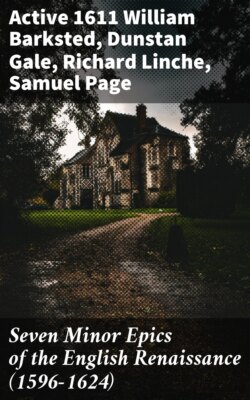Читать книгу Seven Minor Epics of the English Renaissance (1596-1624) - Linche Richard - Страница 4
На сайте Литреса книга снята с продажи.
AUTHORSHIP
ОглавлениеAs befits the paucity of their known literary productions, the authors of these poems have in common chiefly their anonymity, or a degree of obscurity approaching it. The authors of Philos and Licia and of H. A's The Scourge are unknown. Though the authors of the other poems are known, little is known about them. The mystery of the authorship of The Scourge was compounded in the nineteenth century by its incorrect attribution to one Henry Austin. Grosart, for example, argued that the H. A. on the title page and on the address "To the Reader" of the 1614 impression, and the A. H. on the corresponding pages of the 1620 impression, STC 970, was the Austin denounced by Thomas Heywood for stealing his translations of Ovid's Ars Amatoria and De Remedio Amoris. Arthur Melville Clark, in correcting this error, pointed out that these stolen translations of Ovid should not be confused with The Scourge, an original poetic composition based on Book X of a quite different work by Ovid, The Metamorphoses. Clark concluded that "H. A. or A. H. was probably the editor, not the author, although he may have made certain corrections and additions, as the title-page of the second edition states."[7]
However, H. A.—not A. H.—was almost certainly the author of The Scourge, as evidenced, among other details, by the title page of the 1613 Scourge,[8] unknown to Clark, which unequivocally states: "Written by H. A." As to the initials H. A. appended to the address "To the Reader" of the 1614 impression and the A. H. on the title and address pages of the 1620 impression, they were probably printer's errors, arising in the 1614 impression from the printer's careless assumption that the address "To the Reader" was the work of the author rather than the bookseller, and in the impression of 1620 from a simple typographical metathesis of the letters H and A.[9]
The authorship of the remaining five poems, together with such relevant facts of the authors' lives as are known, is as follows. Pyramus and Thisbe is by one Dunstan Gale (fl. 1596), about whom nothing else is known. Dom Diego and Ginevra has long been attributed to Richard Lynche (fl. 1601), otherwise chiefly known for his Diella, a conventional sonnet sequence accompanying Dom Diego, and for his translation of Cartari's Le Imagini, Englished as The Fountaine of Ancient Fiction (1599). Mirrha and Hiren are by William Barksted (fl. 1611), "one of the servants of his Majesties Revels," as the title page of Hiren proclaims. Barksted is believed to have completed The Insatiate Countess after Marston's withdrawal from the stage in 1608 or 1609. This play, bearing Barksted's name in one issue of the 1631 edition, contains a number of lines and phrases identical with lines and phrases in Mirrha and Hiren.[10]
Amos and Laura has been attributed, probably correctly, to Samuel Page (1574–1630),[11] who is mentioned by Meres as "most passionate among us to bewaile and bemoane the perplexities of Love,"[12] and by his fellow-Oxonian Anthony à Wood as long-time Vicar of Deptford.[13] Although a few additional facts are known about these authors, none seems to contribute to an understanding of the poems reprinted, and all may be found under the appropriate authors' names in the DNB.
